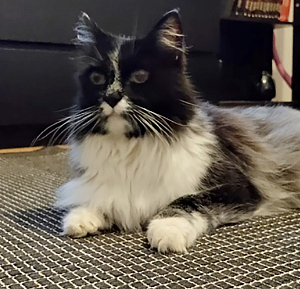
The new 'Salmiak' cat.
Introducing the Salmiak Cat: a captivating new breed with tuxedo charm and unique salt and pepper fur, its striking appearance attributed to a genetic mutation discovered by researchers in a recent study. Inspired by Finland's salty licorice, this feline's distinct coat pattern has captured hearts worldwide.

Hey cat lovers! Researchers have identified a new cat breed that combines the charming appearance and fur markings of the classic black and white tuxedo cat. However, there's a twist: this feline sports a unique mutation where its fur transitions from a solid color at the base, like black, to white at the tips.
The team behind the discovery, comprising scientists and animal welfare advocates, unveiled this unique cat breed in a recent study published in the journal Animal Genetics. They named the distinct coloring of this cat "salmiak," inspired by the salty licorice confection popular in Finland, evoking the salt and pepper appearance of the cat's fur.
In 2007, residents of Central Finland first began noticing local cats sporting distinctive coats. Apart from the unique pattern on their backs, these cats often had white or nearly white tails, and their eyes typically displayed shades of yellow or green.
These felines exhibited various color variations, including black, brown, and tortoiseshell. Initially, due to the rarity of this fur type, there was speculation that they might be infertile. However, this notion was challenged when a salmiak cat surprised observers by giving birth to a litter of irresistibly adorable kittens.
The study involved the researchers obtaining blood samples from five adopted cats for DNA testing. Four of these felines underwent genetic analysis, which revealed no mutations linked to white fur.
Further investigation through whole genome sequencing of two cats unveiled a deletion within the KIT gene. This gene plays a crucial role in determining the presence of white fur in various animals, including cats, horses, and mice.
"In summary, comparative data from other species and genotype segregation analysis support the newly discovered KIT region deletion as potentially being a cause of salmiak coat color in cats," the researchers conclude.
Whether this groundbreaking genetic research will lead to recognition in online pedigreed cat registries like The International Cat Association remains uncertain. However, one thing is clear: these remarkable cats have already found a special place in our hearts




